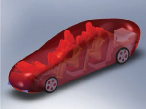Students vie for $10 million auto prize
 With average fuel efficiency of forty-six miles per gallon, the Toyota Prius is the current darling of environmentalists—but a team of Cornell students is working on a car that will more than double that. Some seventy engineering, business, and design students are vying for the Progressive Automotive X Prize in a worldwide competition to build a car that gets at least 100 miles to the gallon. The engineers are experimenting with electric motors and batteries on their test car, a modified 1993 Geo Metro; they will eventually transfer the technology from the Metro to the final vehicle, a four-passenger car that will be short, narrow, and highly aerodynamic. "The car will probably be smaller than Americans are comfortable with," says mechanical engineering professor John Callister, PhD '96, one of the team's advisers. "The front passengers' shoulders will almost touch."
With average fuel efficiency of forty-six miles per gallon, the Toyota Prius is the current darling of environmentalists—but a team of Cornell students is working on a car that will more than double that. Some seventy engineering, business, and design students are vying for the Progressive Automotive X Prize in a worldwide competition to build a car that gets at least 100 miles to the gallon. The engineers are experimenting with electric motors and batteries on their test car, a modified 1993 Geo Metro; they will eventually transfer the technology from the Metro to the final vehicle, a four-passenger car that will be short, narrow, and highly aerodynamic. "The car will probably be smaller than Americans are comfortable with," says mechanical engineering professor John Callister, PhD '96, one of the team's advisers. "The front passengers' shoulders will almost touch."
Supported by corporations and private donors, Cornell's team is one of just two university squads competing against more than ninety other groups. To be eligible for the 2009 qualifying race, teams must adhere to strict carbon dioxide and greenhouse gas emission standards, and have a feasible business plan. The $10 million prize, funded in part by Progressive Insurance, will be awarded to the team that finishes with the fastest car in the final race, to be held in 2010. "The competition educates the public that there is technology available to build cars with really high fuel economy," says Trey Riddle, a mechanical and aerospace engineering grad student and Cornell's team leader. "It's important for us as a nation to push the limit on automotive technology—and for people to realize that there are options out there."
— Jamie Leonard '09


